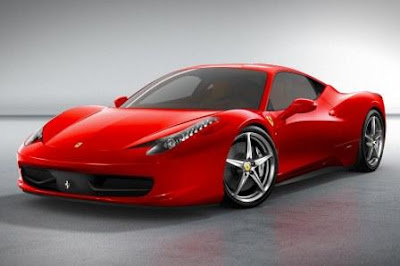
The stunning Ferrari 458 Italia is still fresh from its reveal, but already the slightly mental minds at Motor Authority have dreamed up the car's logical Spider extension, previewed here in these renderings. The Spider will accordingly see production as a 2011 model, giving the Prancing Horse marque time to do the voodoo necessary to cut the roof off an otherwise perfectly good Ferrari.
Keeping the weight down will be the primary mission, since the Spider will likely need some extra internal bracing to maintain sufficient rigidity, pushing it over the coupe's 3,030lb weight.
Ferrari, the noted sports car maker based in Maranello, Italy, was founded in 1928. In the late 1970s, Ferrari introduced its 308, a successor to the Dino 246—the automaker’s first high-volume sports car. The mid-engine, two-seat V-8 model was followed by the Ferrari 328, Ferrari 348, Ferrari 355 and the Ferrari 360 (one of the automaker’s best-selling models ever).
Replacing the F430 as Ferrari’s mid-engine weapon, the Ferrari 458 has a new, direct-injected, 562-hp, 4.5-liter V-8 wrapped in a handsome Italian suit.
Highs
Assaults the senses with awesomeness, easy to drive very fast, accurate steering, an F1-like V-8 that revs to 9000 rpm.
Ferrari's early cars were dominated by V12 engines. Strictly speaking, the first road-going production-V8 Ferrari was the wedge-shaped, Bertone-designed Dino GT4 of 1973.
Since then, this series of uncompromising mid-engine V8 driver's cars has dominated Maranello production. The result is a stiffer car, with much more accurate control of the wheel geometry and lateral movement. Brakes are Brembo carbon-ceramic rotors. Despite all the chassis unobtainium, this 3274-pound car is 300 pounds heavier than the outgoing 430. That means this Ferrari can run to nearly 130 mph before a Toyota Priushits 60 mph.
So never mind the current F430; this car is faster to 60 mph than a Ferrari Enzo and less than a second slower than that epochal million-dollar car to 124 mph. Yikes.
Aerodynamics play a big part in this performance equation. Even the engine bay is vented with high-pressure air from the rear-wheel arches. Downforce at the top speed of 202 mph is equal to 794 pounds, almost a third of this car's curb weight.
Where Mercedes-Benz and Porsche have been going back to basics with their sports cars, Ferrari has unashamedly upped the electronics quotient with the Ferrari 458. The revised suspension provides more accurate wheel articulation, and the steering rack ratio has been made quicker--a mere two turns lock-to-lock. To prevent such a quick rack from feeling too darty at speed, the safety systems (stability control, electronic differential, electronically adjustable dampers, ABS and the engine and transmission controls) are all handled by the same master electronic control unit which speeds responses and allows more tailored intervention. For the future, Ferrari is working on even more advanced chassis control systems inspired by the Northrop Grumman B-2 Stealth bomber, where they engineer an unstable but dynamically superior car and rely on electronic intervention to prevent drivers from getting into trouble.
The Drive
Unlike the old automated manual transmission Ferraris, maneuvering this twin-clutch model is easy, with no telltale whiffs of burning clutch. The steering is so sharp you could cut yourself, and it's very easy to overdrive this car in a series of twitching, elbows-out wheel movements. The engine note is hardcore race car and Italians would stand at the side of the road applauding the scarlet coupe trundling past sounding like an Indy 500 entrant. A car for all seasons? Ferrari says it will be up around 10 percent on the outgoing $187,925 F430 model.